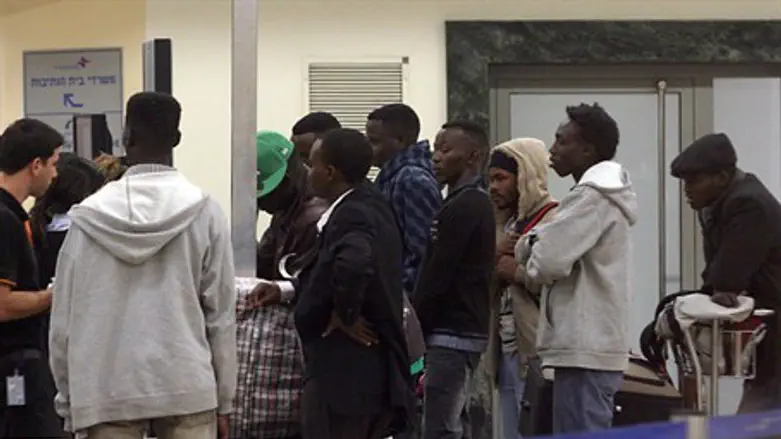
Israel’s 2012 law allowing courts to jail illegal entrants for up to three years without trial is unconstitutional, the Supreme Court has ruled.
While Israel does not have a formal constitution, the Supreme Court has traditionally ruled laws “unconstitutional” if they conflict with Israel’s Basic Laws, which are intended as the eventual basis of a constitution. In this case, the Court ruled that the law in question violates Basic Law: Human Dignity and Liberty.
The 2012 law – an updated version of a 1952 law – aimed to discourage illegal entry by allowing illegal aliens who do not have "refugee" status to be immediately jailed pending deportation, rather than settling in Israeli cities.
The court gave the state 90 days to review the cases of 1,750 illegal entrants currently being held in detention centers, and to set most of them free.
Another roughly 55,000 illegal entrants currently live freely in Israel.
Justice Edna Arbel argued that the 2012 law did not make it easier to deal with illegal entry.
“Israeli society’s need to deal with illegal alien residents is an established fact, and has not changed or lessened since illegal entrants began being put in detention centers. There will apparently be no significant change when this verdict is implemented.”
Judge Uzi Fogelman agreed.
“As hard as it may be to fulfill this mission Israel has been forced into, we must remember that those who have entered our country are already with us. They are entitled to the right to freedom and the right to dignity that the Basic Law gives to every person.”
Justice Miriam Naor expressed enthusiasm. “This could be Israel’s great hour, if, in dealing with the reality that has been forced upon it, it wisely finds humanitarian solutions, solutions based not only in international law, but in the Jewish outlook,” she wrote.
“At the same time, it could also be the great hour of the human rights organizations and those who seek human rights,” she added.
NGOs involved in fighting illegal entry have warned that cancelling the 2012 law will leave Israel with few legal means with which to fight illegal entry.
The topic of illegal immigration is a sensitive one in Israel. Whilst some Israelis have urged the government to be more sympathetic in allowing them to enter the country in search of a better life, others point out that the massive influx of immigrants - most of whom are economic migrants, as opposed to refugees fleeing war or persecution - is unsustainable and potentially destabilizing for as small a country as Israel.
Moreover, residents of Israel's poorest neighborhoods complain that illegal immigrants are responsible for a massive spike in crime, including robbery, sexual assault and rape.
In southern Tel Aviv, where the majority of illegals have settled looking for work, the situation is particularly bad, with residents lamenting a wave of violent crime blamed on illegal African infiltrators.
The Israeli government has moved to solve the problem via the construction of a comprehensive border fence in the south of the country, which has effectively brought the number of illegal infiltrators there to a halt.
The government is also reportedly engaging with African states in a bid to strike a deal which would see illegal immigrants resettled elsewhere, in return for aid.